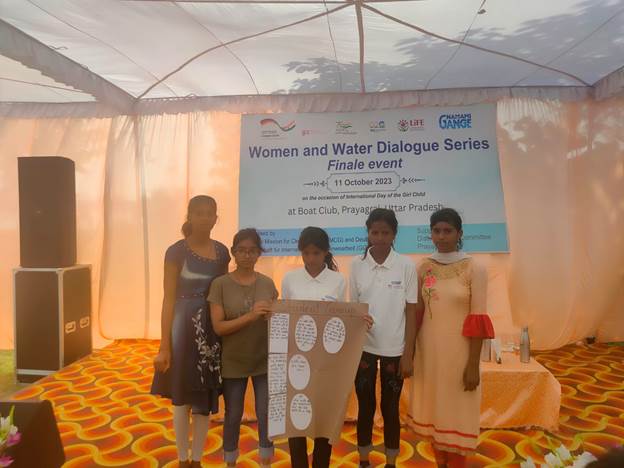NMCG’s ‘Women and Water’ Dialogue Series Concluding Event Held at Prayagraj On Occasion Of International Day Of The Girl Child
The 5th and the concluding event of the ‘Women and Water Dialogue Series’ was organised on 11th October 2023 at the Boat Club House in Prayagraj, Uttar Pradesh. The ‘Women and Water Dialogue Series’ is a programme started during the Ganga Utsav 2022 to highlight the pivotal role of women in the water sector. The 4 events of this series were held in Varanasi, Kanpur, New Delhi and Rishikesh. The 5th and the concluding event coincided with the International Day of the Girl Child and was presided over by Director General, National Mission for Clean Ganga Mr. G. Asok Kumar. Other participants included Ms. Laura Sustersic, Programme Director at SGR, GIZ, Ms. Saumya Pandey, Additional Labour Commissioner, Kanpur, Dr. Swayamprabha Das from Development Alternatives, Ms. Suparna Debroy, woman entrepreneur, Ms. Shipra Pathak from Panchtatva and representatives from SMCGs, District Ganga Committees, district-level authorities, local communities, including women. The closing session also featured a musical program titled ‘Nadi aur Nari’.
Addressing the audience on ‘Gender Inclusion – Government Interventions’, Shri Kumar emphasized the pivotal role of the girl child in shaping the future. He stressed the importance of building a strong foundation for them, empowering them to become a potent force in the future. He also commended the well-timed choice of this day and extended his congratulations to GIZ for their remarkable Women and Water Dialogue program. “The Women and Water Dialogue covered all important towns along Ganga including Varanasi, Kanpur, Delhi, Rishikesh. All programmes were linked to one or the other important day which is helps in connecting with the people,” Shri Kumar added.
DG, NMCG recalled his experience of constructing 1.4 lakh individual toilets and 3000 toilets in 1000 schools during his tenure in the years 2001-02 as District Magistrate in Nizamabad in Telangana. “Women played an important role in that initiative and they benefited the most. Habitation Drinking Water Committees with 5 women members were formed to ensure that their drinking water sources are protected and clean. These initiatives brought about a drastic reduction of diarrhea cases in the region,” DG, NMCG said, adding, “Empowering women has a multiplier effect on the change intended to be brought about. Women are the ambassadors of behavioral change.”
This is reflected in the importance accorded to empower women in the Jal Jeevan Mission and Swachhta Abhiyan being implemented by the central government under the visionary leadership of Prime Minister Mr. Narendra Modi.
Shri Kumar informed the audience about the JALAJ initiative under Namami Gange. “We have launched Jalaj at more than 40 locations in the Ganga basin. A Jalaj Awareness and Management
(JAM) centre has recently been opened at Dilli Haat in New Delhi which is attracting a lot of people to the products made by self-help groups, especially women, in the Ganga basin,” Shri Kumar said, adding, “Jalaj initiative is also aimed at empowering women in the Ganga basin by marketing their locally-produced goods and enhancing their livelihood.”
DG, NMCG also talked about various interventions being made under Namami Gange programme and how the positive impact is visible in the form of improved water quality exemplified by the increased sightings of aquatic species in the river, most notably, the Gangetic Dolphins.
In collaboration with NMCG, GIZ had initiated a comprehensive Women and Water Dialogue Series to highlight the pivotal role of women in the water sector. Traditionally, land and water management decision-making has been male-dominated, sidelining women’s unique knowledge and rights. This has led to women disproportionately bearing the consequences of environmental issues, such as floods and water pollution. Women are primarily responsible for household water management, which becomes challenging due to river pollution from industrial projects and agrochemical contamination.
The platform’s objectives were to spotlight the significant contributions of women across different domains within the water sector, explore avenues for amplifying their impact, and facilitate knowledge sharing. This initiative consisted of a series of in-person and hybrid events held in various locations along the Ganga Basin, with a focus on engaging a diverse audience at local, national, and international levels. The event formats encompassed panel discussions, side events, and cultural presentations celebrating women’s involvement in water-related activities. The overarching goals of the dialogue series were to raise awareness about the importance of women in the water sector, enhance their participation and engagement, and identify strategies for empowering them, especially in decision-making processes.



